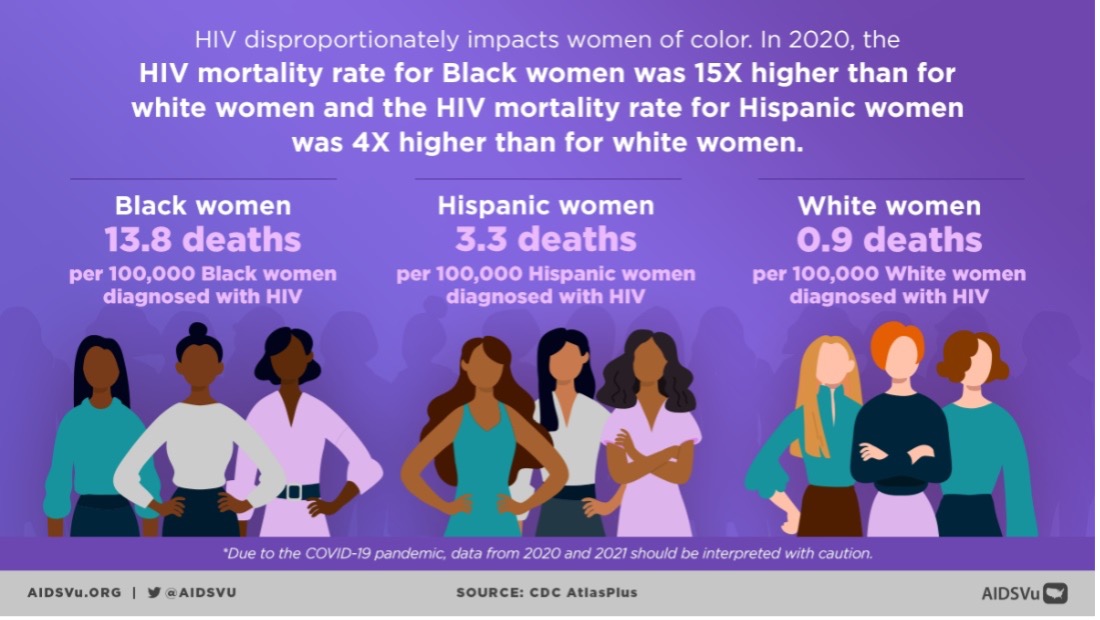Setting the P.A.C.E. – Prevention, Arts and Advocacy, Community, Education
Improving the HIV Landscape for Black Women and Girls in the U.S.
Gilead is committed to helping end the HIV epidemic for everyone, everywhere. To do so, we must address the critical needs of traditionally marginalized communities that have had historically worse health outcomes due to social determinants and other conditions. A focus on communities most impacted by HIV calls for the prioritization of Black women and girls in the United States.
Gilead is working to improve the HIV landscape for Black women and girls through the Setting the P.A.C.E. (Prevention, Arts and Advocacy, Community, Education) initiative, a three-year, $12.6 million commitment toward increasing HIV prevention, anti-stigma and health equity efforts for Black cisgender and Transgender women and girls, who are disproportionately impacted by the HIV epidemic.
In 2021, Black women accounted for 54% of new HIV diagnoses among women aged 16 and older in the United States, despite comprising only 14% of the women living in the country. Additionally, Black Transgender women have the highest rates of new HIV diagnoses among Transgender people and are more likely to go undiagnosed and untreated in comparison to their peers.
These inequities are exacerbated by significant gaps in the delivery of effective and culturally relevant HIV prevention information and care services for Black women and girls.
- Among all women with diagnosed HIV in 2020, Black women had the lowest rates of viral suppression (62%). Viral suppression was also lower among women (63%) compared to the national average (65%).
- In 2020, the HIV mortality rate for Black women was 15 times higher and Hispanic women was 4 times higher than the rate for white women.

In November 2022, Gilead held a listening session with Black women HIV advocates to gain further insight on the specific challenges faced by this community, as well as to explore opportunities to address these issues. Outcomes and recommendations from that meeting are reflected in the following report: Key Learnings Memo - Listening Session with Black Women HIV Advocates, Nov. 2022.
Key Learnings Memo - Listening Session with Black Women HIV Advocates
Program Overview and Grantees
Taking a data-centric and community informed approach, Gilead has provided grant funding to 19 organizations working to improve the HIV landscape for Black women and girls in the United States.
Grantees will address ongoing health inequities in care and treatment through four key programmatic areas: HIV prevention, arts and advocacy, community and education.
Prevention: The Prevention focused grantees will lead the development and delivery of culturally responsive training and collateral to aid in the strengthening and/or establishment of HIV counselling, prevention, testing and linkage to care programs supporting Black women and girls.
Arts and Advocacy: From the U.S. Civil Rights movement to the Gay Liberation movement, art and popular media have always been used as tools for advocacy and education. In this tradition, the Setting the P.A.C.E. Arts and Advocacy focused grantees will use these models to raise HIV awareness and combat stigma.
Community: Community care and healing is important for all people, but it is critically important for Black women and girls as they are often marginalized and de-centered due to misogynoir. Building community allows for Black women and girls to see themselves and their life experiences through the lens of sisterhood, while also building personal and organizational capacity and strength. The Community focused grantees will be responsible for developing and implementing unique community engagement and social impact capacity building experiences to connect and empower Black women and girls as well as Black woman-led and serving health organizations.
Education: As a traditionally marginalized group, and for many multi-layered reasons, health data and educational resources for and by Black women can be limited. The Education focused grantees will develop a creative project to improve the availability of data and resources related to the health and wellbeing of both cisgender and Transgender Black women and girls, especially as it relates to HIV risk, diagnoses and outcomes.
More than 75% of the organizations selected for grants are led by Black women and every funding allocation is directed toward initiatives led or co-led by Black women.
Additionally, the states in which programming will be implemented align with states that have higher numbers of Black women living with HIV.
The 19 Gilead Setting the P.A.C.E. grantees are:
- A New Way of Life Reentry Project (Los Angeles, California)
- AIDS United (Washington, D.C.)
- Baltimore Safe Haven (Baltimore, Maryland)
- California Black Women’s Health Project (Inglewood, California)
- Dancing Grounds (New Orleans, Louisiana)
- Foundations for Living Incorporated (Jefferson, Georgia)
- Howard University (Washington, D.C.)
- National Association of Black Social Workers (Washington, D.C.)
- Power Safe Place Resource Center of Virginia (Front Royal, Virginia)
- Ribbon, Inc. (Largo, Maryland)
- San Francisco Community Health Center (San Francisco, California)
- SisterLove, Inc. (Atlanta, Georgia)
- SLK Health Services Corporation (Lanham, Maryland)
- The Black Women’s Learning Institute (BWLI) at NDRI-USA, Inc. (New York, New York)
- Transinclusive Group (Pembroke Pines, Florida)
- Triumphant Together (Kissimmee, Florida)
- Unspoken Treasure Society (Gainesville, Florida)
- Waco Theater Center (Hollywood, California)
- WeCareTn (Memphis, Tennessee)
An Ongoing Commitment
Setting the P.A.C.E. builds on Gilead’s longstanding commitment toward investing in Black women’s health and leadership through philanthropy. In addition to this new funding, the company has provided more than $35.8 million in philanthropic support for Black women-led and/or Black women-serving organizations in the United States since 2017.
More than $28 million of those investments were granted to organizations working to help end the HIV epidemic.
